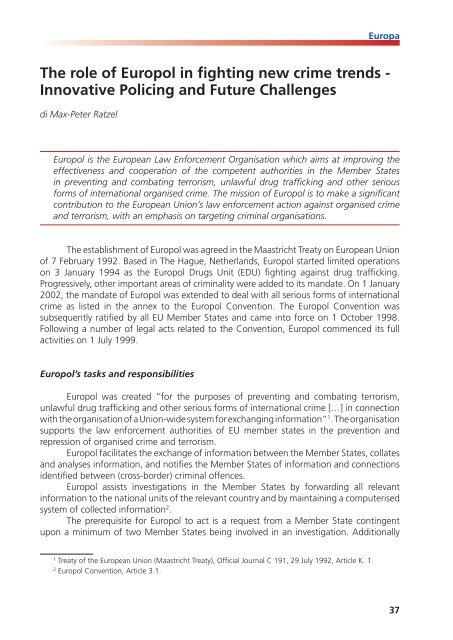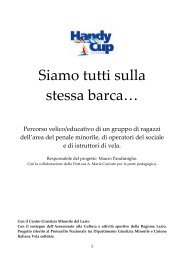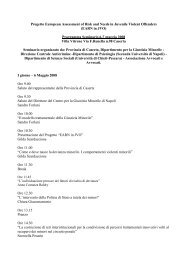Scarica il documento - Dipartimento per la Giustizia Minorile
Scarica il documento - Dipartimento per la Giustizia Minorile
Scarica il documento - Dipartimento per la Giustizia Minorile
Create successful ePaper yourself
Turn your PDF publications into a flip-book with our unique Google optimized e-Paper software.
europa<br />
the role of europol in fighting new crime trends -<br />
innovative policing and Future challenges<br />
di Max-Peter Ratzel<br />
Europol is the European Law Enforcement Organisation which aims at improving the<br />
effectiveness and coo<strong>per</strong>ation of the competent authorities in the Member States<br />
in preventing and combating terrorism, un<strong>la</strong>wful drug trafficking and other serious<br />
forms of international organised crime. The mission of Europol is to make a significant<br />
contribution to the European Union’s <strong>la</strong>w enforcement action against organised crime<br />
and terrorism, with an emphasis on targeting criminal organisations.<br />
the establishment of europol was agreed in the Maastricht treaty on european union<br />
of 7 February 1992. Based in the Hague, Nether<strong>la</strong>nds, europol started limited o<strong>per</strong>ations<br />
on 3 January 1994 as the europol drugs unit (edu) fighting against drug trafficking.<br />
progressively, other important areas of criminality were added to its mandate. on 1 January<br />
2002, the mandate of europol was extended to deal with all serious forms of international<br />
crime as listed in the annex to the europol Convention. the europol Convention was<br />
subsequently ratified by all eu Member states and came into force on 1 october 1998.<br />
Following a number of legal acts re<strong>la</strong>ted to the Convention, europol commenced its full<br />
activities on 1 July 1999.<br />
Europol’s tasks and responsib<strong>il</strong>ities<br />
europol was created “for the purposes of preventing and combating terrorism,<br />
un<strong>la</strong>wful drug trafficking and other serious forms of international crime […] in connection<br />
with the organisation of a union-wide system for exchanging information” 1 . the organisation<br />
supports the <strong>la</strong>w enforcement authorities of eu member states in the prevention and<br />
repression of organised crime and terrorism.<br />
europol fac<strong>il</strong>itates the exchange of information between the Member states, col<strong>la</strong>tes<br />
and analyses information, and notifies the Member states of information and connections<br />
identified between (cross-border) criminal offences.<br />
europol assists investigations in the Member states by forwarding all relevant<br />
information to the national units of the relevant country and by maintaining a computerised<br />
system of collected information 2 .<br />
the prerequisite for europol to act is a request from a Member state contingent<br />
upon a minimum of two Member states being involved in an investigation. additionally<br />
1 treaty of the european union (Maastricht treaty), official Journal C 191, 29 July 1992, article K. 1.<br />
2 europol Convention, article 3.1.<br />
37





